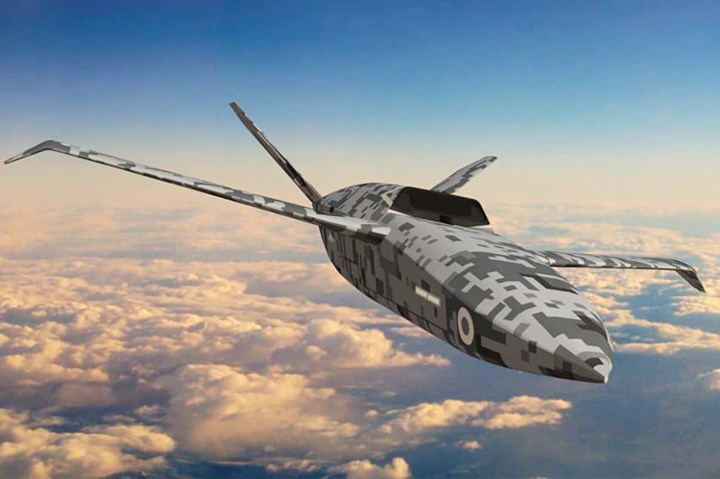Spirit AeroSystems to lead MOSQUITO uncrewed fighter development
U.K. government awards £30-million, three-year contract to design and manufacture a prototype supporting more than 100 jobs in Belfast.

Rendering of U.K. loyal wingman drone. Photo Credit: UK MOD
According to a report from the UK Ministry of Defence (MOD), the U.K. expects to have a prototype loyal wingman-type unmanned aircraft in the air by 2023. The announcement also says that a £30-million contract for the aircraft had been placed with Northern Ireland-based Spirit AeroSystems, which will design and manufacture the Royal Air Force’s Lightweight Affordable Novel Combat Aircraft (LANCA) concept in its new role at the head of Project MOSQUITO, an effort to develop drones capable of working together semi-autonomously with manned aircraft. The deal will be supporting more than 100 jobs in Belfast, Ireland.
The uncrewed combat aircraft will be designed to fly at high-speeds alongside fighter jets, armed with missiles, surveillance and electronic warfare technology. These aircraft will be the U.K.’s first uncrewed platforms able to target and shoot down enemy aircraft and survive against surface-to-air missiles (SAM).
Team MOSQUITO, which also includes Northrop Grumman (London, U.K.), will mature the designs and manufacture a technology demonstrator to generate evidence for a follow-on LANCA program. If successful, Project Mosquito’s findings could lead to this capability being deployed alongside the Typhoon and F-35 Lightning jets, by the end of the decade. LANCA could also be part of the Tempest project.
“Project MOSQUITO is a vital element of our approach to Future Combat Air, rapidly bringing to life design, build and test skills for next-generation combat air capabilities,” says Director Future Combat Air, Richard Berthon. “Autonomous “loyal wingman” aircraft create the opportunity to expand, diversify and rapidly upgrade combat air forces in a cost-effective way, now and in the future.
As announced by the Prime Minister in Nov. 2020, the U.K.’s Future Combat Air System (FCAS) program is set to benefit from a portion of the extra £1.5 billion investment into military research and development.
LANCA was launched in 2015 by the MOD’s Defence Science and Technology Laboratory (Dstl) executive agency and is intended to “understand innovative Combat Air technologies and concepts that offer radical reductions in cost and development time.” While it’s managed by Dstl, LANCA — including Project Mosquito — is led by the RAF’s Rapid Capabilities Office (RCO).
Related Content
-
Orbital Composites wins AFWERX award for Starfighter drone fleet
Under the TACFI contract, Orbital is implementing the AMCM process to build 3D printed composite multi-mission UAS aircraft, surpassing $10 million in government awards.
-
MATECH C/ZrOC composite is deployed in hypersonic aeroshells
Ultra high-temperature insulating CMC targets hypersonics, space heat shields and other demanding applications, tested up to 2760°C under extreme stagnation pressures.
-
“Structured air” TPS safeguards composite structures
Powered by an 85% air/15% pure polyimide aerogel, Blueshift’s novel material system protects structures during transient thermal events from -200°C to beyond 2400°C for rockets, battery boxes and more.
















